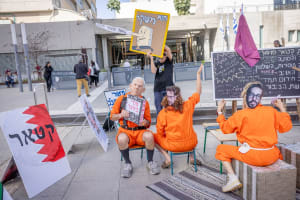Israeli troops begin Lebanon withdrawal, UNIFIL and Lebanese army take over positions in al-Khiam
US CENTCOM General Kurilla inspects withdrawal, meets with Lebanese army commanders

For the first time since the ceasefire in Lebanon took effect two weeks ago, Israeli troops on Wednesday began withdrawing from their positions in southern Lebanon as these were taken over by UN peacekeepers and troops of the Lebanese army.
The IDF announced that “the 7th Brigade concluded their mission in al-Khiam in southern Lebanon. In accordance with the ceasefire understandings and with the coordination of the United States, soldiers of the Lebanese Armed Forces are being deployed in the area together with UNIFIL.”
“The IDF is operating according to the agreements and understandings regarding the ceasefire in Lebanon. The IDF remains deployed in southern Lebanon and will operate against any threat posed to the State of Israel and its citizens,” the army added.
The Israeli troop withdrawal was monitored by U.S. Gen. Michael Kurilla, commander of US CENTCOM, who visited Lebanon to meet with Lebanese officials and representatives of the ceasefire monitoring committee.
The general met with Gen. Joseph Aoun, the commander of the Lebanon Armed Forces (LAF) and Maj.-Gen. Jasper Jeffers, the co-chair of the implementation and monitoring mechanism for the cessation of hostilities between Israel and Lebanon, CENTCOM reported.
“The leaders discussed ongoing efforts to advance a lasting cessation of hostilities between Israel and Lebanon via the mechanism, which is chaired by the U.S. and assisted by France, the United Nations Interim Force in Lebanon (UNIFIL), and the Israel Defense Forces.”
“Gen. Kurilla was present at the implementation and monitoring headquarters today during the ongoing first Israeli Defense Forces withdrawal and Lebanese Armed Forces replacement in Al Khiam, Lebanon as part of the agreement,” the statement read.
Kurilla praised this “important first step in the implementation of a lasting cessation of hostilities,” which he said “lays the foundation for continued progress.”
Lebanese caretaker Prime Minister Najib Mikati praised the Lebanese army for fulfilling its part in the agreement. The Lebanese army is widely considered less powerful than Hezbollah, whose forces controlled southern Lebanon until the war began.
“We salute the army’s efforts in this mission it is carrying out and its leadership’s diligent follow-up of everything that would establish stability in the south,” Mikati wrote on 𝕏.
“The deployment of army units in the Khayyam and Marjayoun areas today represents an essential step to strengthen the army's deployment in the south, in the implementation of the ceasefire resolution,” he added.
The LAF confirmed that it stationed forces in the area around the town, noting they would initially work to locate and clear unexploded munitions left over from the fighting.
The army said it began its deployment after "contacts established by the oversight committee", and called on residents to avoid the area until the deployment was complete.
Kurilla also discussed the ongoing, evolving security situation in Syria, and its impact on stability in the region with Aoun, who is considered a potential candidate to become Lebanon’s next president.
Lebanon's highest office has been vacant for years, due to Hezbollah blocking new elections after the last president’s term expired several years ago.
Kurilla and Aoun also discussed ways to increase the partnership between CENTCOM and LAF, which has long received significant U.S. aid in the form of funds, training and equipment.

The All Israel News Staff is a team of journalists in Israel.













